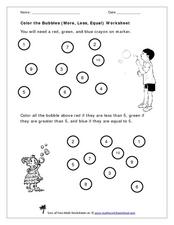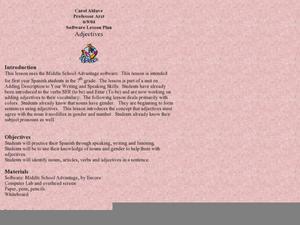Curated OER
Things That Glow
Third graders study the concept of light as an energy source. In this energy lesson students participate in a lab that show them the concept of light as an energy source.
Curated OER
Albedo and Irradiation of Surfaces
Here is a physical science activity where pupils place thermometers inside of a white and a black paper pocket and place them under a lamp. They record and compare the temperature increase over a ten-minute period. Have your class...
Curated OER
Ordinals
Use beaded necklaces to practice with ordinal numbers and sequencing. For the first, scholars color the beads blue, red, or yellow based on their given positions (1st, 3rd, etc.). The next set of beads has learners do the opposite,...
Curated OER
Write the Word
Combine several concepts with youngsters, who will enjoy expressing their artistic side as they identify shapes and practice printing. First, scholars trace the word yellow and use this color to shade all the rectangles they...
Curated OER
Animal Masks
Learners create wonderfully animate animal masks out of balloons. They use the papier-mache technique to create three dimensional animal masks taking care to consider color, shape, texture, and the animals' features.
Curated OER
Paul Gauguin: Complimentary Color
First introduce your art class to the master, Paul Gauguin, then to the concept of complimentary colors. This slideshow provides a bit of background on the famous artist then walks kids through a step-by-step process intended as a study...
Curated OER
Tissue Paper Butterfly
Creating butterfly art is as simple as 1-2-3. Kids cut coffee filters into butterfly shapes. Next, they wet and place squares of tissue paper onto the filters. Fifteen minutes later, they lift the tissue to reveal a colorful pattern...
Curated OER
Crepe or Tissue Paper Blots
What happens when you drip vinegar onto tissue paper? The colors bleed, leaving an interesting and organic design. Get your class observing and creating with this quick-and-easy art project. Tip: This can also be done using coffee...
Curated OER
Cornmeal with Powder Paint
Pre schoolers use art to build observational skills and eye-hand coordination. They squeeze art into a ribbon like shape on their paper, then sprinkle cornmeal and powder paint over it. They watch as water is sprayed on top of the...
Curated OER
Flower Painting/Printmaking
Using old or donated flowers, little learners create flower prints. They discuss the colors found in nature, paint a background, and then create flowers for their pictures by dipping and pressing real flowers onto their paper.
Curated OER
Understanding Visual Fractions
Using fractions as their artistic guide, learners color in parts of five shape images. Each image is segmented based on the denominator, so scholars simply need to apply the numerator to know how much to color. None of these are mixed...
Curated OER
Color the Bubbles (More, Less, Equal)
Combine coloring and number comparisons with your youngsters. They use color coding to identify numbers that are less than, greater than, or equal to five. The 20 numbers are enclosed in bubbles, making this more of a fun...
Curated OER
Benham's Disk
Seeing is believing! Or is it? With this simple experiment, young scientists can explore the concept of visual perception. Attach Benham's disk to a rotating appliance such as a hand drill; As it spins, the black lines appear to be...
Curated OER
Crayon Etching (Scratch Art)
What to do at a time when we have a little extra time to fill and need an activity that won't take a lot of prep? This art project is simple and can be linked to various other subjects. Learners use crayons to color in their paper, then...
Curated OER
Circle, Count, and Color Shapes
Get your geometers familiar with shapes as they circle, color, shade, and count sets of rectangles, triangles, circles, squares, and trapezoids. For each of the 10 sets, they examine six figures and follow instructions to mark the...
Curated OER
Now You See Me, Now You Don't
Bioluminescence fascinates most upper elementary scientists. Display images of different glowing deep-sea organisms and discuss their environment. Young biologists then experiment with images and different colors of filtered light. In...
Curated OER
Write the Word
What a great cross-curricular instructional activity to give to your kindergartners! They get printing practice by tracing the word blue, connecting its meaning by coloring bubbles blue. Finally, they connect the shape of the...
Curated OER
Count and Color Kittens
Young counters respond to three prompts and demonstrate their understanding of ordinal numbers by identifying the first, middle, and last kitten held in a young girl’s sack. After counting the total number of little, furry felines,...
Curated OER
Learning Light's Properties
Students examine the properties of light and the behavior of light during interference. In this electromagnetics lesson students explain behaviors of light.
Curated OER
Graph Paper Patterns
Young artists divide a piece of graph paper into sections using rectangles, squares, and triangles. They then fill each section with patterns of shape and color. Elementary graders describe how their patterns are organized. Secondary...
Curated OER
Yellow
The color yellow is the star of this simple lanuage worksheet. Learners trace the word yellow, count and sort assorted yellow objects, and color stars with the letter Y.
Curated OER
Software Lesson Plan
While this plan uses Middle School Advantage software by Encore, you could still use the attached worksheet if you don't have access to the program. Encourage Spanish learners to work with different adjectives and write descriptive...
Curated OER
ELEMENTS OF DESIGN IN TWENTIETH CENTURY ART
Students examine the elements of design: line, shape, color, space, texture, light. They refer to these elements of design when they view works of art and create their own artwork. They visit the National Gallery Museum.
Curated OER
Understanding Stage Design: Using Visual Elements to Provide Information to an Audience
Students study about theatrical design by developing environments for improvised and scripted scenes. They develop focused ideas for an environment using visual elements.

























